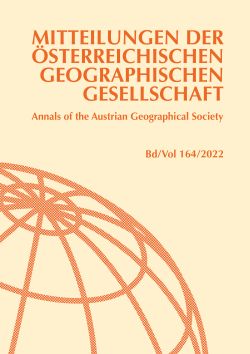Österreichische Geographische Gesellschaft
Mitteilungen der Österreichischen Geographischen Gesellschaft
Annals of the Austrian Geographical Society
Band 164 (Jahresband), Wien 2022
Volume 164 (Annual volume), Vienna 2022
Nora Komposch
S. 253 - 281
doi:
10.1553/moegg164s253
doi:
10.1553/moegg164s253
Abstract:
Numerous studies have shown worker cooperatives’ potential to reduce the precarity and economic exclusion of marginalised groups. However, less is known about their other social effects. In particular, the impact of cooperative work on intimate scales such as family life and the home has received little academic attention. This article examines how joining a worker cooperative changes migrant women’s social position in their intimate spaces: the family and the home. The research focuses on migrant women who are members of cleaning or care-worker cooperatives in New York City. The data were gathered using a participatory research approach in interviews, participant observations, and a quantitative survey. The findings reveal that worker cooperatives have empowering effects on migrant women beyond the sphere of paid work. Worker cooperatives can transform the family spaces of migrant women by increasing their resources as mothers, partners, daughters, and sisters. Although the additional unpaid workload as co-owners of cooperatives represents an extra burden for worker-owners, the women who participated in this study have more flexibility, more time off, and more voice in their families after joining a worker cooperative.
Worker cooperatives, migrant entrepreneurship, family, home, participatory research, New York City
Published Online:
2023/05/03 17:35:27
Object Identifier:
0xc1aa5576 0x003e39c8
Rights:https://creativecommons.org/licenses/by/4.0/
Die zweisprachige internationale wissenschaftliche Fachzeitschrift „Mitteilungen der Österreichischen Geographischen Gesellschaft“ („Annals of the Austrian Geographical Society“) ist das wichtigste regelmäßig erscheinende Organ der „Österreichischen Geographischen Gesellschaft“. Sie erscheint seit 1857 und ist die älteste noch existierende Fachzeitschrift geographischen Inhaltes im deutschen Sprachraum. Dabei werden neue Erkenntnisse aus allen Bereichen der Geographie, Kartographie und verwandter Raumwissenschaften vermittelt, über Fachfragen in Forschung und Lehre, nationale und internationale geographische Aktivitäten sowie Personalia informiert und Gesellschaftsnachrichten publiziert.
Dieser Band beinhaltet ein breites Spektrum fachwissenschaftlicher Beiträge, mit einem Schwerpunkt auf fachspezifischen Analysen zur „COVID-Geographie“, darunter u. a. zu den Auswirkungen der Corona-Pandemie auf die demographische Struktur Österreichs und zu globalen Warenketten und Versorgungsengpässen mit Medizinprodukten während der Pandemie. Weitere Themen sind die Rolle Wiens in den internationalen Direktinvestitionsströmen nach der Ostintegration sowie eine quantitative Analyse zu Veränderungen der strukturellen und regionalen Disparitäten auf dem Arbeitsmarkt in Serbien. Eine Studie über Arbeiter/innen-Kooperativen bei selbstorgansierter Pflegearbeit in New York, Beiträge zur Siedlungsgeographie sowie Politische Geographie und Fachdidaktik runden den Band ab. Würdigungen bedeutender Geographen, Kurzberichte und Buchbesprechungen ergänzen den Band. Mit Beiträgen von A. Wisbauer, Ch. Reiner, J. Kohlbacher, P. Namberger, P. Mayerhofer, M. Grčić, N. Komposch, C. Meyer, H. Job, A. Cercleux, M. Cvitanović u. a.



 Home
Home
 Print
Print
 References
References
 Share
Share
